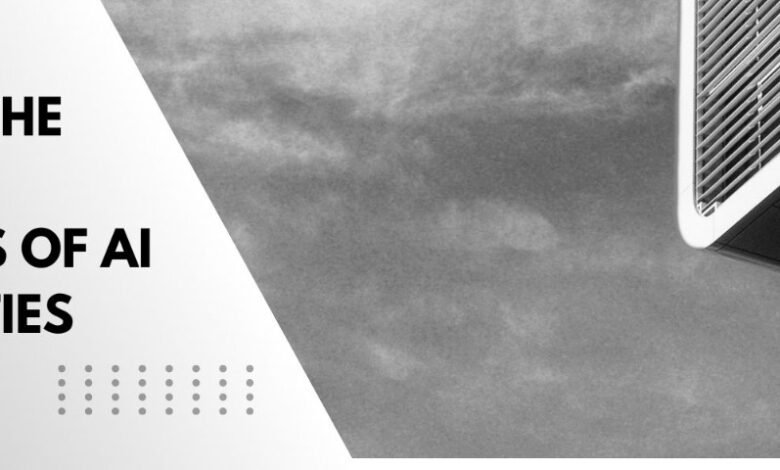Exploring the Trends and Possibilities of AI in Smart Cities

As the world currently is getting more-and-more interconnected, cities across the world are adopting the concept of “smart cities”. The smart cities are currently at the forefront of urban innovation. Smart cities leverage the power of advance technologies like Artificial Intelligence to improve efficiency,bring in sustainability and argument the overall quality of life for the residents.Countries such as Saudi Arabia, UAE, India, Singapore, and Hong Kong are at the forefront of adopting advanced AI technology to transform their urban landscapes and catalyse their smart city development.
This blogaims at exploring the current trends and possibilities of AI in smart cities showcasing how these smart technologies can transform the various aspects of urban living and pave the way for a smarter,more sustainable and connected future.
- Enhance Public Safety: AI has the potential to transform public safety in cities making them safer and more secure for residents. The AI-powered surveillance system and video analytics can be used to detect threats in real-time. Similarly, the facial recognition algorithms can enhance security and identify the potential threats. The predictive policing using AI can be used to analyse the various crime patterns and prevents criminal activities. Moreover, the intelligent disaster response systems, leveraging the power of Artificial Intelligence can coordinate various emergency services. Thus, Artificial Intelligence can revolutionize the way public safety is being maintained in the cities, in turn, helping them transform into smarter and safer cities.
- Intelligent Transportation System: AI can revolutionize transportation in cities and enable improved traffic management, enhance public transit and safer roads. The AI-powered traffic prediction and optimisation algorithms can alleviate congestion.Similarly, the autonomous vehicles and intelligent transportation network can ensure efficient mobility.Again, through real-time data analysis, it becomes possible to facilitate dynamic routing and adaptive traffic control.Lastly, the smart parking system leveraging the power of Artificial Intelligence can help optimise space utilisation and reduce search times.
- Efficient Energy Management:The AI-driven energy management systems can help smart cities to optimise energy consumption, reduce energy wastage, and integrate the renewable energy sources. Moreover, the AI algorithms can analyse the energy patterns, predict demand, and unable better load balancing for more sustainable energy practices.
- Smart Wastes Management: AI can also assist urban wastes management by optimising the process of wastes collection and disposal. By analysing the data on waste generation and monitoring the bin fill levels, AI can also schedule efficient waste collection routes, reduce unnecessary trips and promote cleaner environment.
- Predictive Maintenance: AI can also facilitate predictive maintenance in smart cities. By leveraging advanced data analytics,Machine Learning algorithms and sensor networks, AI can proactively monitor and predict equipment failures and maintenance needs in various city infrastructures like roads, bridges, buildings, etc.Through continuous analysis of the real-time and historical data, AI can also detect various patterns, anomalies, and indicators of potential failures – allowing timely intervention and preventive maintenance activities. The predictive maintenance approach can also help optimise resource allocation, reduce downtime, and enhance the overall efficiency and reliability of critical infrastructures such as transportation networks, energy grids, water management facilities, and so on.
Apart from the above discussed, other potential applications of AI for smart cities include: water management, air quality management, disaster management and the like.
viAct Leveraging AI For Smart Cities
viAct – a Technology Pioneer by the World Economic Forum – leverages the power of AI and video analytics to mitigate the various challenges faced by the traditional cities and offers them AI-powered solutions than can transform them into smart cities. The various AI for smart cities solutions developed by viAct include: Security & Surveillance, Predictive Road Maintenance, Energy Tracking & Prediction, Environmental Monitoring, Smart Parking System, Public Transport Management, Wastes Management, Traffic Management, Crime Detection & Behavioural Monitoring. All these solutionsleverage scenario-based AI video analytics to detect and alert any non-compliant behaviour/situation so as to transform the way cities function.
Conclusion
Thus, it can be concluded that, the integration of AI in smart cities is transforming the way urban environmentsare planned, managed and experienced. By harnessing the power of AI, cities can become more sustainable, efficient, and responsive to the needs of their residents.
Also Read:
- The Future of Indian Railways: Exploring the Potential of AI and Emerging Technologies
- Smart Site Safety System Becoming Must-to-Use in Saudi Arabia’s Infrastructure Development
- Worker Woes, Project Flux & Safety Breach: How AI can rescue Singapore Construction Industry




